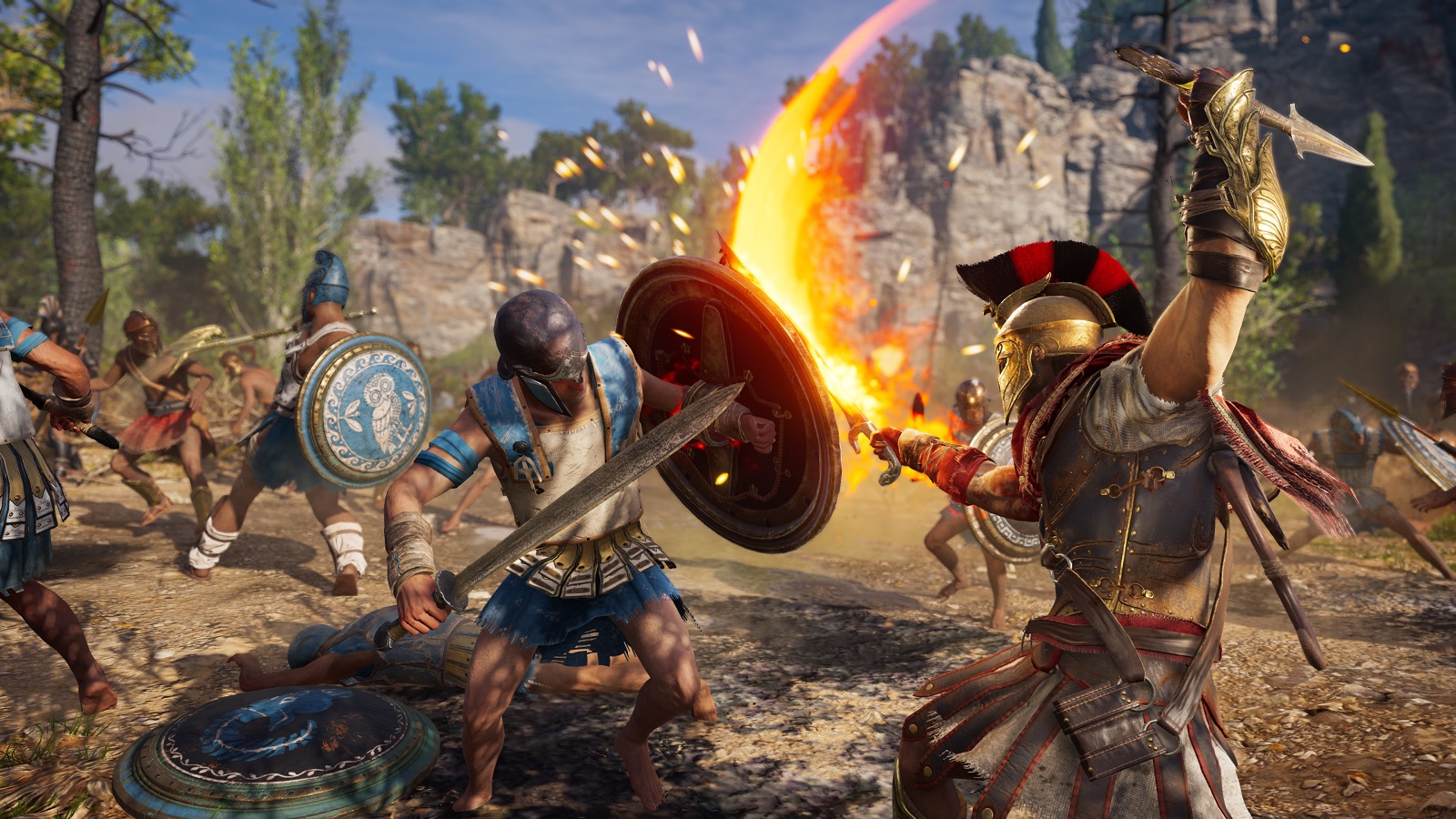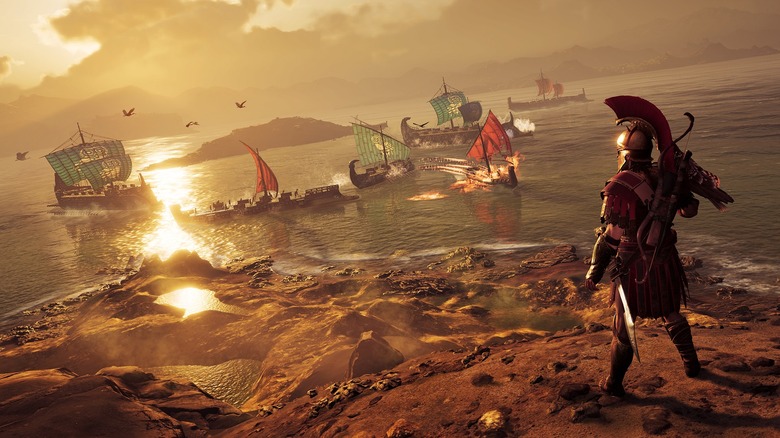4 Things You Might Love About 'Assassin's Creed Odyssey,' And 3 You Might Not
After taking a year off of the Assassin's Creed franchise and then righting the ship with Assassin's Creed Origins, publisher Ubisoft has returned a year later with another entry that shares a great deal in common with Origins, but pushes the series even further away from what it was when it debuted in 2007.
Assassin's Creed Odyssey is the first game to allow you to choose between a male and female protagonist — a pair of siblings named Kassandra and Alexios who live in ancient Greece. I chose to play as Kassandra, the daughter of a great Spartan warrior who ends up losing her family at a young age and having to fend for herself as she learns and grows. But one day, she discovers that her family is still out there somewhere, and this her journey begins.
Below, I've broken down all of the games most notable strengths and weaknesses — the features and moments that might endear you to the game, and those that might push you away. We've done more traditional reviews in the past, but I thought this might be a fun experiment. Feel free to let me know what you think.

1. Stunning scope and scale
I can't remember the last time I was as impressed with a video game world as I am with Assassin's Creed Odyssey's Greece. Every square inch of this dauntingly large map feels purposeful and considered. Every town is unique, every island has a fresh flavor, and you'll meet enough characters along the way to fill an entire franchise.
Odyssey also does an admirable job of pacing out your introduction to its vast world by restricting you on the relatively small island of Kephallonia before setting you loose. Before you leave Kephallonia, you'll have learned about all of the game's primary mechanics, you'll know how to traverse the world effectively, both on foot and on horseback, and you should understand how to upgrade your equipment or swap it out when you find new armor and weapons.
But you can't get a true feel for what the game has to offer until you finally gain access to a boat and begin sailing the open seas. Even if there were no story guiding me on my way, I could (and will) spend hours just sailing from port to port, exploring each new island I came across and taking on anyone (or anything) that stood in my way.
I wouldn't feel this way if not for the level of detail that the development team managed to achieve. There's a very thin line between a bland open world and a vibrant one. Ubisoft Quebec dragged Odyssey over the right side of that line, and as a result, I'm as fascinated with this version of Greece as I was with Vvardenfell the first time I played The Elder Scrolls III: Morrowind. It's just so dense, from the forests to the caves to the underwater coves to the bustling cities filled with people going about their daily lives. Odyssey feels lived in.
2. Visceral, impactful combat
I have played almost every Assassin's Creed to date, and I've spent more time running away from fights than I have actually fighting. That was occasionally the point, but AC's combat never really jived with me. Until Odyssey, anyway. While some may argue that Odyssey's focus on combat veers it away from what made the Assassin's Creed series unique in the first place (more on that later), I simply prefer this balance of stealth and action.
Mechanically, the combat system is similar to that of Assassin's Creed Origins, with a few fundamental (and welcome) changes. There are once again a variety of weapon types, from swords and daggers to spears and staves, as well as your trusty bow for long-distance engagements. But there are no more shields. Rather than block attacks, Kassandra can counter a swing from an enemy with a carefully-timed button press, knocking the enemy back and leaving them open to damage. I find this interaction infinitely more compelling than blocking in Origins.
Then there's the challenge the enemies scattered throughout Greece represent. Even a common soldier can make mincemeat of your character if you don't fight smart, and the tougher enemies can take several minutes to dispatch. Dozens of hours in, even drawn out encounters are still exciting and rewarding.
3. Wide variety of content
It's not just that Odyssey is the biggest, most content-packed Assassin's Creed game ever made, it's how varied that content is. While most missions involve either killing a bunch of baddies, finding something or someone in a distant location, or having a conversation, the details are, once again, what set Odyssey apart.
Want to explore the world? You're never more than a minute or two away from an event or an enemy encampment. Want to blow up and plunder a boat or two? Fast travel to your ship any time and lift the anchor. Are you dispatching enemies too easily? Head to the Arena in Pephka and challenge some of the most fearsome warriors Odyssey has to offer. Finally, when you're ready to advance the story, that quest line will be waiting for you.
It's not often that a game is able to keep me engaged for this long, but I never feel like I'm stuck doing the same thing for too long. If I ever need a break from what I'm doing, there are dozens of other diversions available from one corner of the map to the other that I can take on and mentally reset.
4. RPG elements turned up to 11
Assassin's Creed has always flirted with being an RPG (especially with 2017's Origins), but Odyssey is about as RPG as they come. As incredible as The Witcher 3: Wild Hunt was when it came out in 2015, I really think Odyssey may be a better RPG, with smarter inventory management, better combat, more compelling choices to make in regards to leveling up your character, and, I'm sorry to say it, but a better horse as well.
I'm a sucker for loot drops, which is one of the only reasons that Destiny had its hooks in me for as long as it did. Any time you take out an enemy in Odyssey, there's a chance they'll drop a piece of armor, a weapon, or materials that can be used to upgrade your equipment. Unlike Origins, Odyssey has individual armor pieces for your head, torso, arms, waist, and legs. Common, rare, epic, and legendary gear provide varying perks (with legendary being the most powerful), but the gear also has its own level. So a common level 20 breastplate might be better than a legendary level 15 breastplate. It's not for everyone, but I enjoy managing all of this.
Then there's the new emphasis on cause and effect. This could be a section all its own, but in a huge percentage of the conversations you have with other characters in the game, you will be able to choose how to handle the situation, and it will have an effect on how the event (or even the rest of the game) plays out. Sometimes it's as simple as being aggressive or being patient with someone, and sometimes you might decide to save a family that may or may not have an incurable disease, which then spreads across an entire island, killing thousands.
In addition to being an incredibly competent action game, Odyssey is also a great RPG that lets you be who you want to be and play how you want to play, even if it means dooming entire civilizations along the way.

1. Never-ending campaign
Unless you have 40+ hours to kill, it's entirely possible that you will never reach the end of Odyssey's story. The main campaign is exceptionally long, and as it adhere's to one of the original rules (sins?) of RPG game design, you'll often need to hit a certain level before you can take on the leveled up enemies in the next region.
The length wasn't as big a problem for me personally as it seems to be for many other reviewers. Rather, the sheer number of missions and sidequests and long-term objectives the game throws at you every time you finish anything can be exhausting. If you're someone who likes to tick all of the boxes in games before you move on to the next major event, you might celebrate a few birthdays before you get around to beating Odyssey.
The relatively clean, intuitive menus help to lessen the load somewhat, but much like when I open up Netflix only to spend fifteen minutes scrolling through dozens of movies before eventually closing the app without having watched anything, Odyssey overloads players with too many options far too early in the game.

2. An uneven story from start to finish
There are moments in Assassin's Creed Odyssey that are truly moving and had me anxious to find out what would happen next. But it's incredibly difficult to maintain any sort of narrative momentum when a) the story you're telling is dozens of hours long, and b) the player can effectively avoid the story for hours on end before returning to a moment that might have had an emotional impact if it has occurred immediately after the last story quest.
The voice acting is good, the characters are interesting, and the dynamic between Kassandra and her family (both the makeshift one she finds on Kephallonia and the one that she lost as a child) is one that I was desperate to explore, but the story loses focus a bit too often and I wasn't thrilled with all of the broad strokes.
3. Classic Assassin's Creed is dead
If you've love the Assassin's Creed franchise from the outset, you might be disappointed to find that very little of its DNA remains in Odyssey. Assassin's Creed Origins already felt like a soft reboot of the franchise, and Odyssey takes the series even further away from its old roots, with less than ten minutes of "real world" present day story outside of ancient Greece in the first couple dozen hours of the game. If you're looking for answers about Abstergo and the Animus Project, you might need to reset your expectations, especially in the opening hours.
Furthermore, Odyssey doesn't play much like an Assassin's Creed game either. As I noted earlier, this is often to its benefit in my own view, but if sneaking around, blending into crowds, jumping across rooftops, and traversing through complex environments to perform assassinations are you favorite parts of Assassin's Creed games, you aren't going to find any of that here. There might be another game like that in the future, but this isn't it.

It's true of any game (or any piece of entertainment, for that matter), but your mileage with Assassin's Creed Odyssey will vary greatly depending on what you want from it. As someone who never really clicked with the Assassin's Creed series in its heyday, it turns out that this is exactly what I wanted — a massive action RPG with dozens of hours of content, a polished combat system, and the ability to sail to my heart's content.
While the story was often hit or miss for me, the strengths of the game design overcame basically any quibbles I had, resulting in one of the most successful action RPGs I've played this generation. As long as you aren't too attached to what Assassin's Creed was, I think you might appreciate what Assassin's Creed has become.

